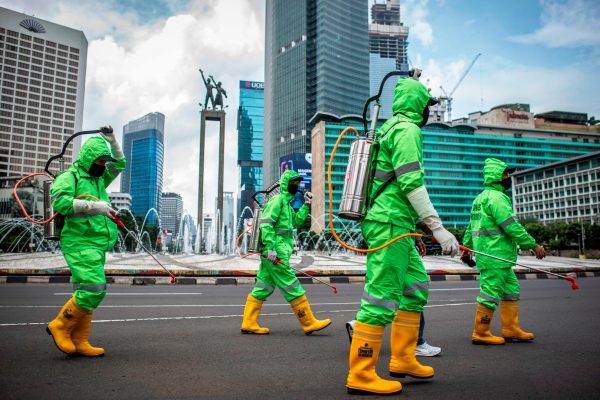COVID-19 and the complexity of connectivity

Historically, more people have been killed by infectious diseases and pandemics than by deadly conflict. Societies have expended considerable effort strategising, in Clausewitz’s words, the employment of battle to achieve the end of war.
But strategic planning to win the war against deadly viruses must deal with the complex problem of an enemy wreaking havoc upon multiple dimensions of our hyperconnected socio-ecological system simultaneously.
When the World Health Organization declared COVID-19 a pandemic on 11 March, most national governments were underprepared. Yet for decades infectious disease specialists have warned that epidemics will become more frequent and indeed an existential security threat because of globalisation, population growth, inequalities and climate change.
The unprecedented connectivity of globalisation — mass transit systems within mega-cities, affordable and prevalent air travel, huge cruise ships, commutes across oceans and continents, frequent international meetings and global supply chains — exacerbates pandemic conditions. As a result, governments’ policy space and time they have to deliver essential services have shrunk.
Governments have responded to COVID-19 by limiting connectivity through lockdowns, travel restrictions and border closures. Yet a wholesale shutdown on connectivity is not the answer. Scientific collaboration and joint global leadership are vital for getting through this crisis. The key question is how to optimise the opportunities of system connectivity while minimising its risks.
COVID-19 is a system tipping-point — it will reset globalisation as we know it. Like the GFC, this pandemic demonstrates that the costs of connectivity can outweigh its benefits. The fundamental challenge today is the trade-off between connectivity and resilience, the latter being a society’s ability to bounce back from systemic shock.
As complexity theorists recognise, connectivity boosts systemic resilience — but only up to a point, after which the relationship can become inverse. This is especially true when numerous interconnections multiply very quickly across a social system and can generate unintentional and unpredictable effects.
China’s economic growth has largely been good for the world economy. However, COVID-19’s much greater systemic impact compared to SARS is a result of the exponential increase of linkages between China and the rest of the world since 2003 as it has grown to be the world’s second largest economy.
Strategic policy that balances connectivity and resilience is needed to position, prepare and nudge national systems into zones that optimise for resilience.
First, this requires a sea-change in policy-making mindsets. The traditional focus on the national interest must give way to emphasising how to keep our hyperconnected socio-ecological system thriving, particularly given the complexity of international linkages that mean that a small single event can trigger cascading effects down multiple chains.
Second, with this mindset, governments should identify more effective ways to mobilise state capacity to fight diseases of connectivity like COVID-19.
For example, richer countries or international health organisations should raise an international pandemic monitoring system in each world region as the first line of defence against pandemics.
Pandemics must be fought not only at their epicentres, but also at the weakest links in the international system. Collapse at these weak points that can trigger cascades and tip the system into an unpredictable situation, but early intervention can be effective.
For COVID-19, the weakest links include refugee camps, slums, fragile states and countries with poor health systems. According to UN figures, 2.2 billion people worldwide lack access to water and 4.2 billion lack basic sanitation.
Pandemics must be fought equally hard on the economic front. But this battle must also be won at a system-level for any national recovery to be sustainable.
While G20 leaders have promised to do ‘whatever it takes’ to support the global financial system against COVID-19, further international cooperation to prevent trade protectionism and competitive currency devaluations is needed to boost the multilateral trading system’s resilience against this systemic shock.
Third, strategic policy for COVID-19 must privilege domestic resilience. Diversification — of food and medical and other strategic supplies — buffers against the failure of supply chains. Critical infrastructure needs better shock-proofing.
Pandemic capacity must include the entire health system, from general practitioners to general hospitals and specialist communicable disease facilities. Australia produces much of its own food but food security during global supply chain disruptions also requires credible national fuel stockpiles to transport produce across a continent.
Finally, governments must navigate their countries’ political systems and social attributes to find the most appropriate way to gain public confidence and compliance for managing any public health threat.
This pandemic lays bare the crucial variable of state capacity. It also presents the opportunity to reset globalisation by seeking a healthier balance between connectivity and resilience. Changing strategic mindsets is key.
The impending economic recession compels a shrinkage of national and global economies but the eventual recovery of economic activity should not necessarily be based on pre-COVID-19 levels.
Australia’s summer of climate disaster had already brought home the dangers of our current carbon footprint. To build resilience in the face of connectivity, now is the time to rethink our way of life and pivot towards what is responsible and what is sustainable.
This article was written by Evelyn Goh, the Shedden Professor of Strategic Policy Studies at the Strategic and Defence Studies Centre at ANU and Jochen Prantl, the Associate Professor of International Relations at the Coral Bell School of Asia Pacific Affairs. It was published by the East Asia Forum.
Professor Evelyn Goh is the convenor of GRADNAS and the Shedden Professor of Strategic Policy Studies at the Australian National University, where she also is Director of Research at the Strategic and Defence Studies Centre.














